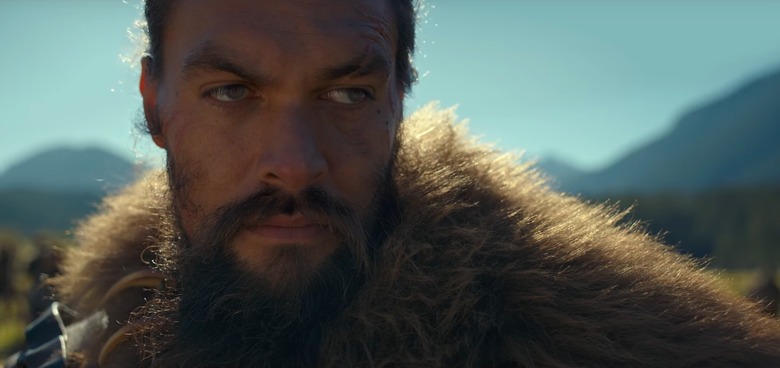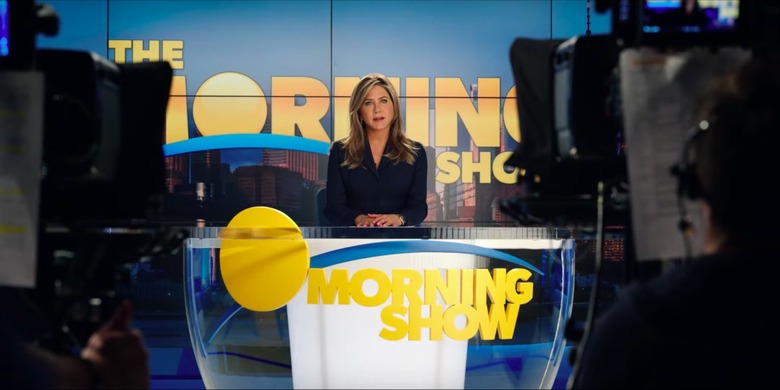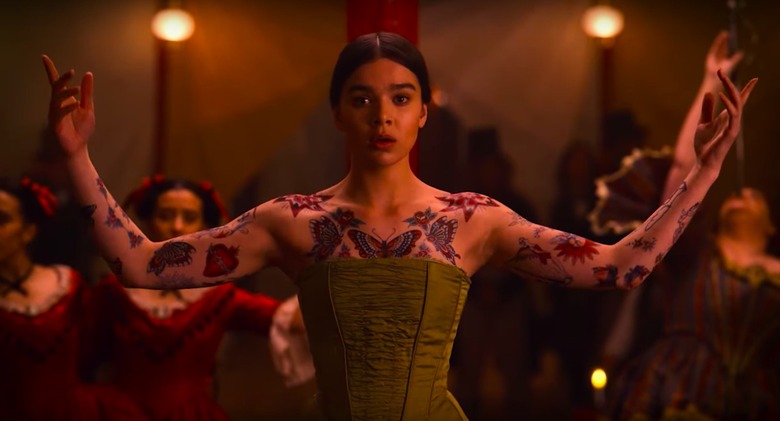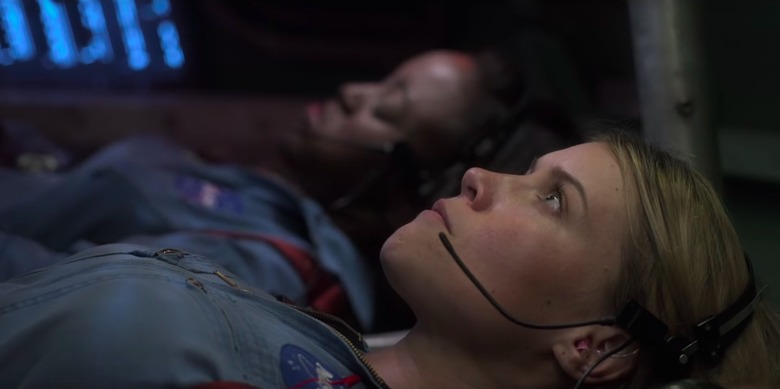Apple TV+ Series Review Round-Up: How Are 'See', 'The Morning Show', 'Dickinson' And 'For All Mankind'?
The first reviews of the new shows that will be available when the Apple TV+ streaming service launches at the end of the week have hit the web. The four big shows that Apple will have available at launch include the sci-fi epic See, the news business drama The Morning Show, the period comedy Dickinson, and the show which imagines what happens if the space race never ended, For All Mankind. So how are Apple's first attempts at creating original content? We've got a full Apple TV+ shows review round-up so you can find out.
See
First up, we've got the ambitious series See, starring Jason Momoa and Alfre Woodard living in a post-apocalyptic future where everyone is blind and has adapted to the world as they now have to experience it. Watch the trailer here.
Daniel D'Addario at Variety was not impressed with the show, saying that it needs source material in order to keep focus:
"See," a pure genre exercise originating from the mind of writer Steven Knight, sorely craves the sort of pure structural integrity that source material can provide. Spiraling away from narrative control as its first three episodes unreel, this series, about a post-apocalyptic future in which nearly everyone is blind, wastes the time of Jason Momoa and Alfre Woodard, among others, on a story that starts from a position of fun, giddy strangeness and drags itself forward at a lugubrious pace. Source material would have provided structure (which many original properties have, but this one certainly does not). It also might have provided a control of tone. Knight, director/EP Francis Lawrence, and showrunner Dan Shotz have made a show whose elaborate look and grave tone aim for "Game of Thrones" but whose content is lower of brow and, sadly, of quality.
Danette Chavez at The AV Club also walked away disappointed, finding the mix of The Hunger Games, Blade Runner 2049 and A Quiet Place too messy to make sense of:
This mix of influences and eras is ultimately more confusing than it is cohesive. The verdant background offers a compelling counterpoint to most dystopias, which often imagine either a sterile, skyscraper-filled world or a desolate wasteland. But there are so many other standard dystopian ideas at play here as to rob that decision of its novelty—after a forced reset, portions of humanity have still given into their basest instincts. Slavery exists, and women are threatened with sexual assault.
Allison Shoemaker at Paste found the series to have admirable qualities, but they don't distract from the show's ludicrous nature:
See looks great. It also looks expensive, which it was, reportedly clocking in at $15 million an episode; it was composed with obvious care, arriving at shots that'll just knock your socks right off your feet a few times an episode. The richness of the production design echoes the detail of the world-building, which in turn reflects the ambition of the filmmaking. All good things. But the quality that most defines this Apple TV+ series is one that is, unfortunately, just as thickly layered: It is deeply, inescapably, and not even all that enjoyably ridiculous. So again I ask, do you remember Waterworld, the wildly expensive post-apocalyptic movie where Kevin Costner and Tina Majorino search for a mythic place known as DryLand? See has big Waterworld energy. Both determinedly commit to even the most ludicrous elements of their premise, swinging for the fences with the energy and confidence of a dude who once read a thing about baseball and is now clearly an expert. It strikes out at nearly every turn, but you've got to admire the spirit.
Haleigh Foutch at Collider found the goofiness of the series' premise working for her and was rather positive about the series:
There's lots to be said for the performances here, especially Hoeks as Queen Kane, who channels a more volatile version of the stoic certainty that made her so terrifying in Blade Runner 2049, but ultimately it's the world-building that makes See such compelling watching. It's clear that Knight and his creative team have given a lot of thought to what their dystopian post-sight world looks like; from literal visual clues, like the abandoned dam that the Queen now calls her castle and the long-forgotten bicycles grown into tree trunks, to the broader strokes of invention. From architecture and communication to class structures and religion, See builds a complex and believable future for the human race and unveils the details with a series of well-structured reveals.
Daniel Feinberg at The Hollywood Reporter found commendable elements within See, but it never quite comes together to make an overall good show:
Through its first three episodes, Apple TV+'s new drama See is a roller-coaster of a show. No hour went by without my checking my watch, giggling at several ridiculous performance choices and writing down multiple nonsensical plot points in my notes. Yet no hour went by without a concept or two that I found intriguing, a shot or two that I found breathtaking or an action scene that I found ambitious.
As you'll find is a trend with this first batch of Apple TV+ originals, See isn't close to a good show thus far, but it does just enough to make you believe that under the right circumstances, there might be a good show here somewhere, eventually.
The Morning Show
Next up, we have The Morning Show, starring Jennifer Aniston, Reese Witherspoon, and Steve Carell. The series follows Aniston and Carell as co-hosts of a popular morning show not unlike The Today Show as the latter finds himself fired for sexual misconduct. Meanwhile, an up-and-coming reporter at a conservative affiliate finds her career in the spotlight after one of her political outbursts goes viral, putting her in line for the recently open co-hosting gig at The Morning Show. Watch the trailer here.
Amy Amatengelo at Paste says the series isn't worth signing up for Apple TV+ at launch, but didn't necessarily hate it:
The most damning thing I can say about The Morning Show, the star-studded drama that is part of Apple TV+'s big launch this Friday, is that it's fine. Reminiscent of Studio 60 on the Sunset Strip with its frenetic take on putting on live television, the show is like an old-school network drama—which again is perfectly fine, but not exactly what one would hope for when discussing the crown jewel of the streaming launch.
Daniel Feinberg at The Hollywood Reporter doesn't think this series is the best showcase for the future of Apple TV+:
If you know where to look, nearly every TV show or movie has seams. A moment of hastily rendered CG. A line of ADR dialogue meant to smooth over a plot hole. A mismatched bit of lighting from a reshoot. The trick is to be so swept up that you don't notice the seams.
For at least its first two episodes, The Morning Show, the most star-studded and vaunted offering from the initial offering of Apple TV+ originals, is perhaps the seam-iest drama you'll ever see. One needn't know the show's bumpy creative history — rare separate "created by" (Jay Carson) and "developed by" (eventual showrunner Kerry Ehrin) credits give some indication — to be aware of the series struggling and floundering to find its focus, tone and attitude toward its main characters.
After a brutally dull pilot and a meandering second episode, there are distinct hints in the third hour of a more satisfying and confident The Morning Show, one that actually gets value out of leading ladies Jennifer Aniston and Reese Witherspoon. But did the behemoths at Apple really get into the crowded original TV marketplace to become the latest perpetrator of "It eventually gets better!" patience-testing?
Ben Travers at IndieWire couldn't bring himself to care about the characters or anything they're doing:
Watching "The Morning Show" is a bit like watching "The Big Short," except nothing is said straight-to-camera and nearly everything is boring. Adam McKay's Oscar-winning 2015 film was so worried about its complicated, term-heavy plot that it gussied up every other aspect of the production; there's a cheeky voiceover, a star-studded ensemble, and even diegetic celebrity explainers, like Margot Robbie breaking down subprime mortgages from a bathtub. All this was in service of a dire message: unchecked bad behavior will repeat itself, even on a global scale.
Apple's first drama — from an amalgamation of writers and producers including creator Jay Carson, showrunner Kerry Ehrin, and writer/executive producer Michael Ellenberg — has the opposite problem: It trusts its story without knowing what it's trying to say. All the pretty people in the world can't keep you hooked when the purpose is this muddled, and hoo boy, is it hard to figure out what "The Morning Show" wants to accomplish, or even who we're meant to care about.
Daniel D'Addario at Variety felt the same sentiments and finds Apple's content settling into mediocrity instead of excellence:
It's perhaps unsurprising that Apple, a bleeding-edge tech company whose streaming service represents TV's vanguard, had so little sensibility for what morning TV means to its viewers or its practitioners. But it's very odd that this company devoted to excellence, given a situation with so many potential points of entry, seems to have settled for so much less than it might otherwise have acheived. (Perhaps it's proof positive that content really is different from other feats of engineering.) "The Morning Show," in trying to sell all sides of its story without committing to telling a single one well, falls startlingly short. And, worst of all, there's not a human worth caring about in sight.
Adam Chitwood at Collider offers some dissension among the crowd and found plenty to enjoy:
It's unclear if The Morning Show is destined to make the same pop cultural imprint that House of Cards or Stranger Things or Breaking Bad did. The TV landscape is positively flooded with content at the moment, and there's more competition for your eyeballs than ever. But you can't say Apple TV+ didn't put all it had into The Morning Show, and despite reports of some creative upheaval behind the scenes, the resulting show is a pretty smooth ride. There's a lot to like, and it's a series that is tackling complicated issues like sexual misconduct, unchecked misogyny, women in positions of power, and the changing media landscape with refreshing complexity. As far as first impressions go, this introduction from Apple TV+ ain't too shabby.
Dickinson
We also have Apple's series that seems to be geared towards a younger audience with a story about the life of Emily Dickinson as told through a modern lens, not unlike Sofia Coppola's Marie Antoinette. Hailee Steinfeld takes the lead role as the rebellious poet while Mimi Leder directs. Watch the trailer here.
Alexis Gunderson at Paste had a blast watching this series:
Despite all the mystery surrounding her long, hermetic life, it's hard to imagine that the real Emily Dickinson (she of the poetic syntax so wildly removed from the style of her time that it wasn't until 1955 that publishers stopped editing all her linguistic ecstasies into comparatively dull normalcy), wouldn't get a kick out of Dickinson, Alena Smith and Hailee Steinfeld's lovingly weird imagining of the poet's young adulthood. Dickinson is so fun and so strange and so tireless in handing out little moments of character development, with wildly original mood setting, you could watch thousands of hours of television and still not think to expect, of course, the Dickinson who scrawled out "Wild nights – Wild nights!" and left behind thousands of scraps of genius in a locked chest would dig it.
With only three episodes provided for review and all of Emily's real, long life such a legit mystery, it's difficult to gauge what the central arc of the whole season might be. But with such gorgeous cinematography, costuming, and metatextual design, and with every actor putting in such fun, charming, deeply specific (read: often deeply odd) performances—and with Smith and Steinfeld, especially, so blazingly self-confident in their vision—it seems entirely likely that Dickinson will be one of the brightest debuts of 2019.
Libby Hill at IndieWire wished she had more time to spend with Dickinson as the show starts to figure itself out in the third episode made available for review:
To best enjoy the new Apple TV+ series "Dickinson," you need to disabuse yourself of the notion that it has anything to do with posthumous poetry goddess and all-around depressive Emily Dickinson. That's the only way you'll be able to wrap your head around the anachronistic half-hour comedy from Alena Smith, dedicated to rebranding the poet as a rebellious #teen who never met a rule she couldn't break.
Unfortunately, the pilot episode of the half-hour comedy, "Because I could not stop," works hard to prevent that disassociation in its audience. There are heavy-handed Dickinson references, where Emily (Hailee Steinfeld) literally meets with Death (Wiz Khalifa, because sure), and stanzas of her poems are scrawled across the screen as she writes. These touches emphasize the eponymous historical figure, but work at cross-purposes with making the show, well, good.
As it progresses, "Dickinson" becomes more self-assured and less dependent on the legacy of its heroine. By Episode 3, titled "Wild nights," the series has settled comfortably into what it was always meant to be — a coming-of-age comedy — and slowly becomes a quiet revelation.
Robyn Bahr over at The Hollywood Reporter was unamused by the proceedings:
The bloated episodes from creator Alena Smith lack definable jokes, unless the mere dichotomy between fusty 19th century costumes and modern inflections like a synth pop soundtrack and anachronistic profanity is supposed to make you laugh. It didn't make me laugh. As I watched Emily (Hailee Steinfeld) and her friends dribble the poppy tears onto their tongues at a house party and gaily bop around like they're on molly, I, a self-professed historian killjoy, couldn't help but think of the slumped, lifeless bodies of an opium den.
Caroline Framke at Variety finds the show confounding in its execution, not really settling on the kind of show it wants to be:
Watching "Dickinson" is a strange experience, and not just because it's a deliberately strange retelling of poet Emily Dickinson's life complete with bass-heavy needle drops and hallucinations of Death as a man with a Cheshire Cat smirk (played by, this is true, Wiz Khalifa). For all the big creative swings the new Apple TV Plus series takes, it feels suspended between several different approaches without committing to a single one. It's not a comedy, nor a drama, nor even quite a "dramedy." It's at least adjacent to a teen show in the vein of a high school series you might find on the CW, until it's not. It's not parody, nor entirely sincere. It's possible to find a unique space amidst all the set categories within television, but at least in its first three episodes, "Dickinson" has trouble doing so outside its basic premise, which boils down to, "what if Emily Dickinson could literally call 'bullshit' on the patriarchy?" If at one point Emily (played by executive producer Hailee Steinfeld) emerged from her stately Amherst home in a Forever 21 shirt emblazoned with "#FEMINIST," it wouldn't be the least bit surprising.
Meanwhile, Allie Gemmill over at Collider couldn't get enough of the series:
Having seen the first three episodes of Dickinson for this review, I can confidently tell you this show is a ray of light. The half-hour series is very much cut from the same cloth as the teen dramas populating Freeform and The CW with tinges of HBO's Euphoria, all filtered through the same anachronistic lens that gave us 2006's Marie Antoinette. And yet, despite these similarities, it's clear that series creator and writer Alena Smith is confident in the take she has for telling a fictionalized version of Dickinson's teenage years.
For All Mankind
Finally, we have For All Mankind, a series from Battlestar Galactica creator Ronald D. Moore that imagines what would have happened if the Space Race between the Soviet Union and the United States never ended. It might be the breakout series of Apple TV+'s first round of original programming. Watch the trailer here.
Jacob Oller at Paste is over the moon (no pun intended) for the series:
After seeing eight episodes of the ten-episode season, For All Mankind has already set itself apart as the must-see show of Apple TV+.
Rather than pure golden glow, For All Mankind leaves you smiling and ugly crying at the same time, amazed that humanity has achieved so much despite all its stupid pettiness. It wouldn't be as amazing if they were all soft, warm Tom Hanks perfection.
Instead, we get a Mad Men meets The Martian vibe, where suspenseful problem-solving and meticulous technical details are bolstered by strong period aesthetics and ensemble relationships knit so tightly they'll repel your needle. And did I mention that the cast (especially Dorman) is excellent? While the show can wield a West Wing-esque inspiration with the best of them, For All Mankind still delivers breath-holding exercises in anxiety. It looks great and it sounds even better. Space scenes are always keen to drop out to total silence or overwhelm their beautiful cinematography with harsh astronaut breathing that demands our attention.
Tim Goodman at The Hollywood Reporter says the show is ambitious, but maybe drags too much:
When you start thinking about what For All Mankind could have done with an alternative-history approach, kind of like what Amazon's The Man in the High Castle does on Amazon, it's a little disappointing to see that, through seven of 10 episodes, there's not much done with the concept (other than Ted Kennedy became president after Richard Nixon and some equally minor tweaks). It's ultimately just a narrative contrivance to put our country behind and make it angry with an inferiority complex, setting up a plan to get there quickly and get women up there kinda quickly and then maybe set up a military base there, because that's what Nixon is really pushing for as the American political interest revolves mainly around the U.S. versus the USSR.
Which is fine but familiar, even in this alternative history world.
Unless some major twists pop up at the end, it seems like a lot of work for what ultimately becomes a story about astronauts and their wives (and husbands), with some social commentary tossed in when needed. The oddest thing about For All Mankind, which Moore created with Matt Wolpert and Ben Nedivi, is that you're thinking it will be something other when ultimately what it becomes is something more. Its ambition rests on multiple characters and plotlines, with a decreasing sense of interest the more numerous they become (not to mention a lag on the pacing, which could use some of the aforementioned jet fuel to move things along).
Steve Greene at IndieWire was intrigued by the show's premise, but found it to be mostly squandered:
Across its opening season, this new Apple TV+ drama certainly does its best to rewrite the NASA history books. But that reimagining comes with a series of self-imposed narrative restraints. Presented with a bevy of options, "For All Mankind" spends most of its episodes presenting this new world in the least imaginative and most inert ways possible.
If there's one thing "For All Mankind" does more than anything else, it's remind you what's at stake. From NASA mission program head Deke Slayton (Chris Bauer) to veteran astronaut Gordo Stevens (Michael Dorman), the series' through-line characters are burdened with having to sell the enormity of their respective missions every time there's a new development. Every word insists on its own importance, whether it's in arguments with spouses or envoys from the show's various presidential administrations. When the gratingly standard TV network news missives and magazine headlines can't carry the weight of how the show's reality is different, every early conversation is drenched in a barrage of heavy emotional snippets to pick up the slack.
Haleigh Foutch at Collider enjoyed the series, but also found that it might take itself too seriously:
It's a very loving, optimistic look at what might have happened had we been compelled to double down on space exploration rather than pulling back the moment we staked our claim on the moon. The series regularly jumps months, and occasionally years, in pursuit of exploring how that change in focus (and funding) could have altered the course of history, and boy, For All Mankind is determined to play it deadly straight.
In fact, that might be the show's biggest disadvantage. For All Mankind takes itself very seriously and moves very slowly despite the time jumps, methodically pacing out the cultural shifts down to minute detail, and rarely surprising with the results, especially in the first half. That said, there are definitely standout moments and fantastic performances — the fifth episode, "Into the Abyss" delivers some tightly-paced thrills, exploring the mental cost exacted on the spouses our heroic astronauts leave at home, and the seventh episode "Hi Bob" is a wonderful bottle episode.
Caroline Framke at Variety found the new show to be mostly compelling:
Of the original series launching Apple's streaming TV service Monday, "For All Mankind" is by far the strongest, especially because it makes the most of its budget and subsequent capacity to dream a bit bigger than most. Its production and costume design evolve to fit the changing times, and its handsome direction shines brightest in space. The writing has some shaggy tendencies, as could probably be expected of a show this ambitious. It occasionally entertains a few wry winks to the strange new historical possibilities on this hypothetical timeline, and even indulges in some distracting fictional Nixon tapes revealing the depths to which he might have gone to save face. For the most part, though, it makes the smarter choice to keep the drama as grounded in character choices as possible, with some key overarching "what if?" scenarios that keep the season moving toward a bold new future.
***
Well, it doesn't sound like quite the well-received debut that Apple TV+ was hoping for. It seems the star-studded, big shows that Apple hoped would become their flagship launches don't quite measure up to the more low-key offerings. While The Morning Show and See seem to stumble in their debut, Dickinson and For All Mankind mostly seem to succeed. Of course, it remains to be seen what audiences will think of these shows, or if they're even enough for Apple TV+ to have a decent audience at all. Apple has a lot to prove with this streaming service, and at launch, I'm not sure they'll have the goods to rake many people in.
Apple TV+ launches this Friday, November 1.




